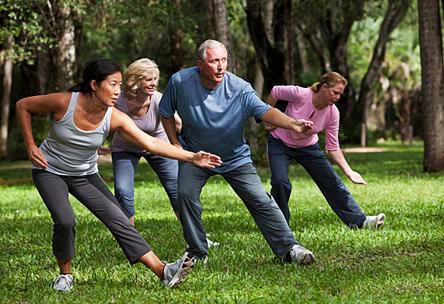
It has details about your personal coverage and how to make the most of your plan. You can find the website on your Aetna Member ID card.
To build your best defense against colds, flu, COVID-19 and other infections, your daily habits matter. Use this five-step mini challenge to make the right immune-boosting moves second nature.

Our world is full of viruses and bacteria. The only way to avoid them entirely is to live in a sterile bubble. But who wants to do that? A better and more realistic solution: Boost your immune system, so your body can protect itself against germs that could make you sick.
The best way to boost your immunity is to get recommended vaccines. That includes flu and COVID-19 shots, as well as the pneumonia vaccine.* Beyond that, it’s all about focusing on everyday things that can help keep your immune system thriving.
With cold and flu season here, now is the perfect time to make sure your daily habits are keeping you healthy and strong. Our fun five-step immune-boost challenge can help.
Here’s how it works. Below are five simple habits proven to help protect you against illness. Pick a day to begin the challenge. On day 1, try a new tip, like taking time to decompress. On day 2, add a second tip to your daily routine. Then keep going until you hit day 5.
At the end of the challenge, you’ll have five new habits that can help keep you healthy this fall, winter and beyond. Plus, they’ll support your immune system’s healing powers if you do catch a bug. Let’s begin.

It has details about your personal coverage and how to make the most of your plan. You can find the website on your Aetna Member ID card.
This is really your first line of defense. Washing your hands regularly and thoroughly lowers the number of germs your body must fight off. Here’s when it’s most important to scrub up:
But don’t rush the process of washing your hands or you won’t do much good. The best way to wash your hands free of the most germs is to:
You also should keep a small supply of alcohol-based hand sanitizer close by.
Get medical advice whenever you need it
A registered nurse is just a phone call away. Call our 24/7 Nurse Line at 1-800-556-1555 (TTY: 711) to speak with a nurse, 24 hours a day, 7 days a week. If it’s an emergency, dial 911.
The more colorful the fruits and vegetables you eat, the greater variety of nutrients you get. For example, you’ll get plenty of vitamin A in cantaloupe, sweet potatoes, spinach and red peppers. Vitamin A plays a key role in the growth and function of immune cells that fight off viruses.* And vitamin C — found in oranges, strawberries, broccoli and bell peppers — helps heal wounds and repair tissues all over the body. It may also help shorten the length of a cold by up to 1½ days, according to research.*
To get a jump on having brightly colored produce at every meal, try this for breakfast. Have a smoothie made with a frozen banana, blueberries, strawberries, spinach and almond milk.
Exercise can boost your immunity. Try to regularly get up to 45 minutes of moderate-intensity exercise to strengthen your body’s natural defenses. But don’t push your body too hard. That’s especially true for older adults and people who have a chronic condition such as diabetes or heart disease.*
So what is moderate exercise? Here are some things to try:*
Your secure member website is waiting
To check your coverage and benefit costs, you can use your plan web page. It’s listed on your Aetna member ID card. Sign in.
Too often, sleep takes a back seat to everything else in life that we need to do. And sometimes, worrying about those to-dos keeps us up at night. But, lost sleep takes a toll on the immune system. Too little sleep can increase your risk of infection and of developing conditions like heart disease.*
For today’s immune-boosting challenge, focus on putting sleep first. Ditch the late-night emails and chores. Turn off electronic devices such as your TV and smartphone at least an hour before bedtime. (The light from screens can keep you up.) And go to bed at a reasonable hour — a time that lets you get between seven and nine hours of sleep.
A little stress is normal. In fact, it can even ramp up your immune system and get it ready for a fight. But stress that goes on without relief can weaken your immune system. So try to find a little time every day to lower your stress levels.
Looking for some new ways to ease stress? Studies show mind-body therapies such as meditation, yoga, tai chi or qi gong can help improve coping, quality of life and well-being. Doing mind-body therapies regularly can even lower chronic inflammation. You can start by doing an online yoga video — there are options for all levels. Or download a meditation app on your smartphone.

Aetna is a recipient of the Newsweek Best Customer Service Award for 2023.*
*FOR VACCINES AND IMMUNITY SOURCE: Centers for Disease Control and Prevention. Immunization Schedules: Table 1. Recommended Adult Immunization Schedule for ages 19 years or older, United States, 2021. February 12, 2021. Accessed September 21, 2023.
*FOR LINK BETWEEN IMMUNITY AND NUTRITION SOURCE: Stephensen CB, Lietz G. Vitamin A in resistance to and recovery from infection: relevance to SARS-CoV2. British Journal of Nutrition. January 20, 2021: 1–10. Accessed September 21, 2023.
*FOR LINK BETWEEN NUTRITION AND COLDS SOURCE: Academy of Nutrition and Dietetics. How vitamin C supports a healthy immune system. EatRight.org. November 6, 2022. Accessed September 21, 2023.
*FOR LINK BETWEEN EXERCISE AND COLDS SOURCE: Simpson RJ, Campbell JP, Gleeson M, Kruger K et al. Can exercise affect immune function to increase susceptibility to infection? Exercise Immunology Review. 2020; 26: 8-22. Accessed September 21, 2023.
*FOR MORE ON TYPES OF EXERCISES SOURCE: Cleveland Clinic. What does moderate exercise mean, anyway? A guide to calculating your heart rate. October 23, 2020. Accessed September 21, 2023.
*FOR LINK BETWEEN SLEEP AND IMMUNITY SOURCE: Centers for Disease Control and Prevention. NIOSH training for nurses on shift work and long work hours. March 31, 2020. Accessed September 21, 2023.
*FOR NEWSWEEK AWARD: The 2023 Newsweek America's Best Customer Service rankings were identified from the results of an independent survey of more than 30,000 U.S. customers who have either made purchases, used services, or gathered information about products or services in the past three years. Customers evaluated several brands: in total over 200,000 evaluations were collected. The awarded brands each received on average 100 evaluations from customers. For more information visit https://www.newsweek.com/rankings/americas-best-customer-service-2023
For language services, please call the number on your member ID card and request an operator. For other language services: Español | 中⽂ | Tiếng Việt | 한국어 | Tagalog | Pусский | ةيبرعلا| | Kreyòl | Français | Polski | Português | Italiano | Deutsch | ⽇本語 | فارسی | Other languages…
See Evidence of Coverage for a complete description of plan benefits, exclusions, limitations and conditions of coverage. Plan features and availability may vary by service area. Participating health care providers are independent contractors and are neither agents nor employees of Aetna. The availability of any particular provider cannot be guaranteed, and provider network composition is subject to change.
©2025 Aetna Inc.
Y0001_NR_35899_2024_C
1903109-35-01
Call us at 1-833-570-6670 (TTY: 711), 8 AM and 8 PM local time, 7 days a week. Or visit Aetna.com/Medicare